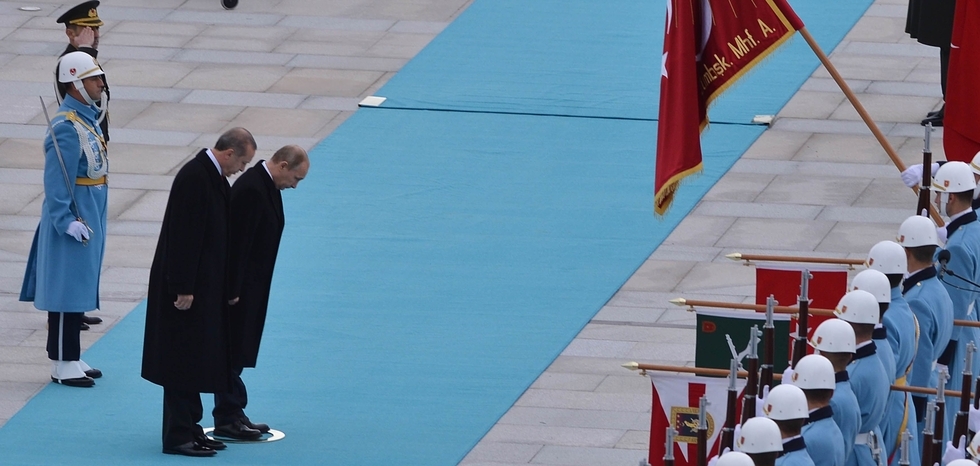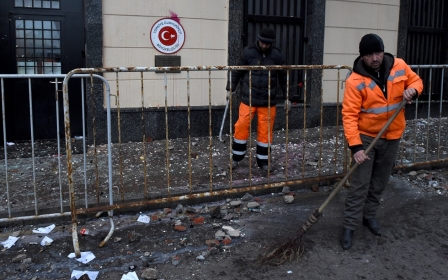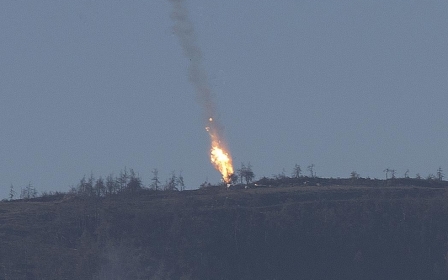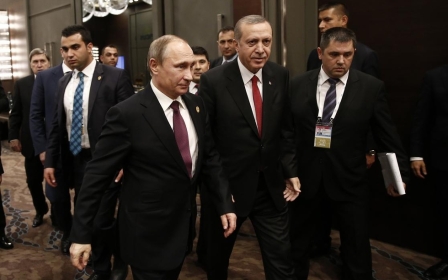
Turkey-Russian crisis: More about geography than history
Both Turkish President Recep Tayyip Erdogan and his Russian counterpart Vladimir Putin are good readers of history. Each of them has his own solid historic convictions. This was evident in the speeches and election campaigns of both presidents. However, we should be cautious about seeing history as the main driver of relations between states, especially when we talk about states with established interests and stable geography. Relations between Turkey and Russia are subject to the demands of geography rather than a common bitter history.
It is common in politics to invoke history. In his 2012 election campaign, the Russian president talked about New Russia, a term used by Peter the Great, the most famous tsar in Russian history to describe the lands he annexed by force to his state at the beginning of the 18th Century, turning Russia into an empire and giving himself the title of Emperor Peter the Great.
On the Turkish side, the historical dimension was noticeable in the Turkish president's election campaign and successive speeches that re-established the link between the modern Turkish state and its Seljuk and Ottoman past.
The appeal to history in both cases is however motivated by domestic considerations. Both countries are living through a state of transition along their political and social path.
Putin is seeking to establish what he calls New Russia while the Turkish Justice and Development Party is endeavouring to build what it calls New Turkey. Yet, there is one essential difference between the two.
Past glories
Putin's Russia, in fact, is not new at all. It is the same Russia that yearns to return to the past. The dreams of Moscow that sits on the throne of the Soviet Union continue to tempt the former KGB agent who has said repeatedly that the collapse of the Soviet Union was the biggest political disaster of the 20th Century. Putin has not forgotten the enormity of the insult dealt to Russia in the aftermath of the collapse of the Soviet Union particularly during the reign of his predecessor, Boris Yeltsin: economic collapse, lawlessness, minority rebellions and loss of prestige.
That was evident during the 2008 Russian military invasion in Georgia. It was even more evident when Putin annexed Crimea and intervened in Eastern Ukraine using as a pretext a law that obliges the Kremlin to protect Russian minorities wherever they happen to be. This, by the way, was exactly what Peter the Great did when he occupied the Ukraine and subjected it to the hegemony of the Russian state and gave himself the title of Emperor of all Russians.
New Turkey, on the other hand, does not aspire to rebuild the past glories of the Ottomans. The Turkish state is more concerned with its civilisational circumference, not out of a desire to impose military hegemony but in an endeavour to reconnect with a mutual history as a driving force for the future. In so doing, Turkey was fighting an inheritance that pitted Turk against Arab.
With regards to the recent crisis between Russia and Turkey, let's look at the impact of history on the behaviour of both states and find out whether the tendency on the part of both Putin and Erdogan to invoke history is a decisive factor in managing the crisis.
Putin, who keeps a drawing of Peter the Great in his own office, used history over the past few years in order to bestow nationalist legitimacy over his regime. Following the collapse of the Soviet Union and its communist ideology, Putin understood that the history of Tsarist Russia would be an effective resource for building a new legitimacy and for asserting Russia's distinction and historic uniqueness and would be an appropriate pretext for combating political reforms and public liberties, arguing that these are nothing but Western projects alien to Russian society aimed at undermining it and stripping it of its own identity.
In addition to the political employment of history, Putin admires the personally of Peter the Great, often invoking him. He also laid a bundle of flowers on the historic statue of Peter the Great on the Day of the Russian Navy last July since Peter the Great was the first ruler to build a Russian naval fleet in the Black Sea.
Without doubt Putin must have seen the final will of Emperor Peter the Great in which he recommended to his followers that they should continue tirelessly their endeavour to seize Constantinople and pursue conquests all the way to the Gulf waters and the Indian shores, considering that whoever controls Constantinople would be in a position to control the entire world.
Controlling Constantinople
Peter the Great arrived at this conclusion following a bitter experience and successive war with the Ottoman state during which he forged an alliance with the Safavid dynasty in Iran while directing all his efforts against their mutual Ottoman enemy.
But why did the Russian emperor, who reigned in Russia for more than 40 years (1682-1725), consider that whoever controlled Constantinople controlled the world? Was this because of history and the profound bitterness felt by the fall of Constantinople, the capital of Orthodoxy, to Muslim hands in the middle of the 15th Century? This is, assuming of course, that its fall precipitated in the Russian mind-set at the time the concept of the Exceptional Mission of the Russian Nation, which considered itself the rightful inheritor of the authentic Christian banner, both confronted by Muslims who took Constantinople and the heretic Catholics who reigned in Rome?
I do not believe so, for Peter the Great was known for his disregard for the Church; he was the one who took away its independence and annexed it to the Tsaristcourt so as to become a puppet in his hand after having been a global religious point of reference of great symbolism.
Most probably, the reason behind Peter the Great's will about the importance of Constantinople was not to do with history but with geography.
When Putin glances over his country's massive map he feels proud. He is the president of a country that has the largest area in the entire world. It is true that the population of Federal Russia is 144 million, which is less than half that of the US population, which is around 333 million, but the area of Russia is more than 6.5 million square miles, that is about double the area of the United States of America.
Russian geography
Geography has provided Russia with expanse and a massive presence connecting with both the European and the Asian continents. But geography itself is the reason why Russia senses great danger and feels constantly threatened. This explains many of the attitudes of the Russian state and explains its wars, reflexes and ambitions.
The geography of the largest state in the world suffers from several problems including the massive uninhabited areas of harsh environment in the east.
The long Russian borders are difficult to protect and control. Yet, two essential problems constantly constitute the strategic Russian complex. The first problem is its strategic exposure to the West due to the absence of natural geographic barriers capable of deterring invading armies from Europe. The second problem is the old Russian dream of reaching the warm waters of the Mediterranean and the Indian Ocean.
The exposure of the Russian borders to the Western European neighbourhood was always a justification for Moscow to adopt the strategy of offence for the sake of defence. This the strategy that was adopted by the tsars of Russia and by the leaders of the Soviet Union. It is the same strategy that propelled Putin to intervene in Georgia and the Ukraine so as to prevent them from joining the European Union and NATO. Russia simply cannot allow NATO to install missiles at a stone's throw from Moscow.
The second complex is that most of Russia's ports overlook the Arctic Ocean and do not function in winter because the water of the ocean are frozen. Russia is in dire need of ports overlooking warm waters and this, for it, is a matter of national security. Perhaps this is what explains the major historic conflict over the Crimean Peninsula, which overlooks the Black Sea, between the Ottoman State and Tsarist Russia.
And perhaps this is what explains Putin's swift move last year to annex Crimea to Russia. Crimean does offer Russia access to waters that do not freeze in winter. As soon as he annexed Crimea, Putin quickly embarked on building 80 naval ships and a number of military submarines in the port of Sevastopol. His objective is to possess an advanced naval force in the Black Sea.
Turkish straits
However, the dream of access to the warm waters cannot be accomplished in full by having Russian ports overlooking the Black Sea. Once again, geography is the reason. Russian commercial and naval ships cannot exit the Black Sea or enter it via the Turkish Bosphorus Strait. Passage toward the Mediterranean will have to be via another Turkish strait, the Dardanelles.
The 1936 Montreux Agreement guaranteed international navigation across both Straits during peace times. However, both straits remains under Turkish sovereignty. Turkey can, under the pretext of organising shipping navigation, delay the passage of Russian commercial ships if it so wishes. In the case of war, Turkey's control over the passage of war ships may become tougher.
Hence, the existence of a Russian military base in the Syrian port of Tartus became extremely important from Moscow's point of view. This is the only port that is available for the Russian military ships to use in the Mediterranean, well away from all those straits and numerous geographic knots.
Going back to the crisis that erupted between Turkey and Russia following the shooting down of the Russian fighter plane over the Turkish-Syrian border, the necessities of geography and the complex mesh of mutual interests prevent an escalation of conflict. Each of the two parties has its own reasons.
Intertwined interests
Turkey knows that a number of factors are against an escalation of tension with Russia: it imports 55 per cent of its gas from Russia; it shares the neighbourhood in Central Asia; it has common interests in the Black Sea. This is what explains the calm Turkish rhetoric in the aftermath of the downing of the plane.
On the Russian side, Turkey's NATO membership is a fundamental deterrent. But in addition there is also Russia's need for strategic partnerships with Turkey. These are quite important, especially with regard to the gas pipeline project that Russia counts on in order to have access to Europe in the aftermath of the deterioration of relations between Russia and the Ukraine.
It is also important for Russia to have economic access with Turkey following the European sanctions. All these factors will bar Russia from going far in taking action against Turkey. It is worth noting, for instance, that the Russian government quickly announced that sanctions do not apply to gas, which will continue to flow via two pipelines into Turkey. Using gas as a weapon in this case might be regarded as a serious escalation that would harm Russia as much as, if not more than, it would harm Turkey.
In addition, Russia does not want to wage an open conflict across three fronts at the same time. Its intervention in the Ukraine has been costly and doubt is cast over its feasibility. Starting a battle with Turkey would not be an acceptable strategic option at the present time.
The steps announced by Moscow against Turkey respond to Putin's personal feeling of humiliation that a Russian fighter jet was shot down by Turkey. Putin is anxious about his image as a strong man. In fact he expressed that feeling when he described the incident as a stab in the back. He was counting on Turkey in his confrontation with the West. He did indeed make that public in December last year when he described Erdogan as a man with strong personality because he resisted Western pressures. He even announced the signing by both countries of a mutual energy agreement. This came after Turkey refused to take part in imposing sanctions against Russia and after signing wide-ranging economic agreements with it.
Russian military intervention in Syria
However, it would seem that Putin misunderstood Turkey. He counted on economic interests but paid no attention to Turkish national security interests. He intervened militarily in Syria without any consideration for the Turkish strategic depth. He went far in insulting Turkey when his fighter jets targeted Syrian rebels who are allied with Turkey, which had no option but to send a strong message by shooting down the Russian plane upon violating Turkish air space. That was a firm but a calculated message.
The crisis between the two sides will gradually calm down. Putin will try to regain some of his prestige by means of economic sanctions and tough rhetoric. However, common interests will soon push both sides in the direction of calm. Political considerations are determined by necessities and not emotions. In the case of both Turkey and Russia, the necessities of geography and the interests of the economy take precedence over the bitterness of history and the reactions of the present.
The Russian adventure in Syria was not well calculated. Russia's predicament will grow deeper. Perhaps the memories of the Soviet intervention in Afghanistan will resurface as Russian losses, both human and material, continue to mount. The downing of the Russian plane was a Turkish message to the effect that the Orient which Putin thought was an arena of an open strategic void is much more complex than he thinks and is much more dangerous than he reckons.
- Wadah Khanfar is president of Al-Sharq Forum and a former director general of the Al-Jazeera Network.
Photo: Russian President Vladimir Putin (R) greets the Turkish Presidential Guard Regiment as he is guided by Turkish President Recep Tayyip Erdogan (L) during the official welcoming ceremony at Turkey's Presidential Palace in Ankara, on 1 December, 2014 (AFP/TURKISH PRESIDENTAL PRESS OFFICE).
New MEE newsletter: Jerusalem Dispatch
Sign up to get the latest insights and analysis on Israel-Palestine, alongside Turkey Unpacked and other MEE newsletters
Middle East Eye delivers independent and unrivalled coverage and analysis of the Middle East, North Africa and beyond. To learn more about republishing this content and the associated fees, please fill out this form. More about MEE can be found here.




